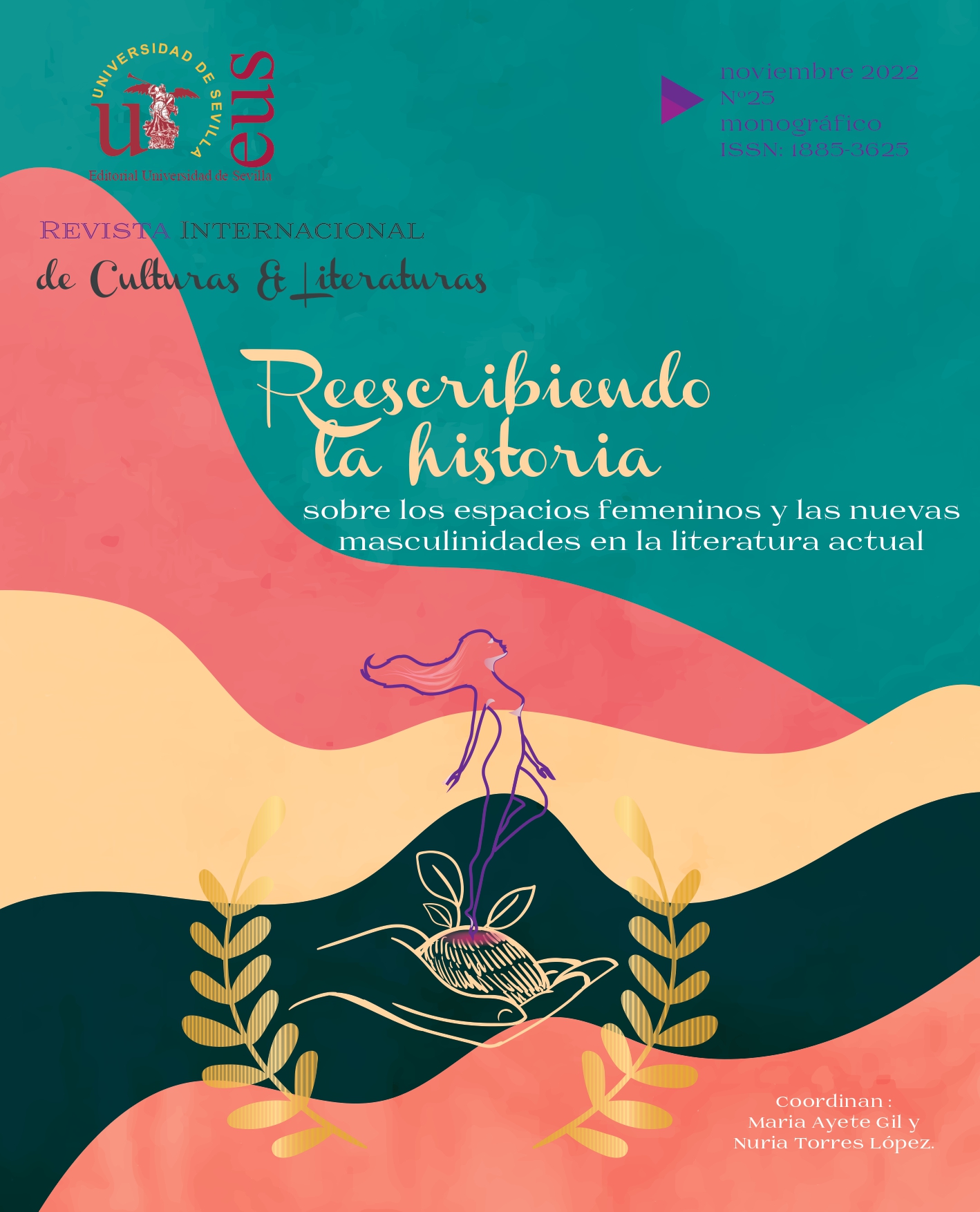No Angels in the House in Martin McDonagh’s The Beauty Queen of Leenane and Eimear McBride’s A Girl Is a Half Formed Thing
DOI:
https://doi.org/10.12795/RICL2022.i25.18Keywords:
female Irish identity, abuse, trauma, failureAbstract
This paper aims at analyzing the complex female constructions of identity, trauma and personal failure in Martin McDonagh’s The Beauty Queen of Leenane (1996), and Eimear McBride’s A Girl Is a Half Formed Thing (2013). As the title suggests, “No Angels in the House” refers to the central role motherhood has firmly held in traditional Irish society, and how progressively this sublimination of the mother figure has evidenced a deeper somber side of domestic life. I explore the concept of the maternal in both works, and how the devastating consequences of a rigid religious upbringing will stigmatize the protagonists’ lives forever. I also analyze the post-traumatic stress disorder that the two female protagonists suffer when they fail to assert themselves in such hostile environment. In this framework, the final part of this work is devoted to reflecting upon the acknowledgement of personal failure and the impossibility of redemption. The illusion of freedom coupled with the sociocultural breeding provoke the subversion of the moral edicts, and the death of the protagonists who seem to disintegrate and fade away into a non-existence of their own.
Key words: female Irish identity, abuse, trauma, failure.
Downloads
References
BEAUVOIR, SIMONE. (1972). The Second Sex. Penguin, Harmondsworth.
BELL, LESLIE J. (2021). “The Production of Male Mothers”. Nancy Chodorow and the Reproduction of Mothering. Forty Years on. Petra Bueskens editor. Palgrave, McMillan. University of Melbourne. 191-202.
BOYD, CAROL J. (1989). “Mothers and Daughters; a Discussion of Theory and Research”. Journal of Marriage and Family. 5(2). National Council of family Relations. 291-301.
BOURKE, JOANNA. (1993). Husbandry to Housewifery: Women, Economic Change and Housework in Ireland, 1890-1914 Oxford: Clarendon Press.
BROWN, LAURA S. (1995). “Not Outside the Range: One Feminist Perspective on Psychic Trauma”. Trauma: Explorations in Memory, edited by Cathy Caruth, Johns Hopkins UP. 100-112.
CAHILL, SUSAN. (2017) “A Girl is a Half-Formed Thing?: Girlhood, Trauma, and Resistance in Post-Tiger Irish Literature”. LIT: Literature Interpretation Theory. 28(2), 153-171.
CHODOROW, NANCY. (1978). The Reproduction of Mothering: Psychoanalysis and the Sociology of Gender. Berkeley and Los Angeles. University of California Press.
(1989). Feminism and Psychoanalytic Theory. New Haven and London. Yale University Press.
CONRAD, KATHRYN A. (2004). Locked in the Family Cell: Gender, Sexuality, and Political Agency in Irish Nationalist Discourse. U of Wisconsin P. Terrace Books.
DIAMOND, ELIN (1997). Unmaking Mimesis: Essays on Feminism and Theater. London, Routledge.
DIEHL, HEATH (2001). “Classic Realism, Irish Nationalism, and a New Breed of Angry Young Man in Martin McDonagh's The Beauty Queen of Leenane.” The Journal of the Midwest Modern Language Association, 34, 97-117.
ERIKSON, KAI. (1976). Everything in Its Path. New York. Simon and Schuster.
GARRATT, ROBERT F. (2011). Trauma and History in the Irish Novel: The Return of the Dead. Palgrave Macmillan.
GRENE, NICHOLAS. (2000). “Black Pastoral: 1990s Images of Ireland”. Litteraria Pragensia, 20(10), 67-75.
(2005) “Ireland in Two Minds: Martin McDonagh and Conor McPherson”. The Yearbook of English Studies: Irish Writing since 1950, 298-311.
GROSZ, ELISABETH. (1989). Sexual Subversions: Three French Feminists. Sydney: Allen & Unwin,
HERMAN, JUDITH LEWIS (2001) Trauma and Recovery: From Domestic Abuse to Political Terror. Pandora, London.
HILL, MYRTLE (2003). Women in Ireland: A Century of Change. Belfast, Blackstaff Press.
HOWES, MARJORIE. (1996). Yeats’s Nations: Gender, Class, and Irishness. Cambridge: Cambridge University Press
KRISTEVA, JULIA. (1982) Powers of Horror: An Essay on Abjection. Trans. Leon S. Roudiez. New York, Columbia UP.
(1993). Nations without Nationalism. Trans. Leon S. Roudiez. New York, Columbia UP.
McBRIDE, EIMEAR. (2013) A Girl is a Half-formed Thing. Galley Beggar Press.
McDONAGH, MARTIN. (2009) The Beauty Queen of Leenane. London, Methuen Drama.
MEANEY, GERARDINE. (1991). Sex and Nation: Women in Irish Culture and Politics. Dublin, Attic Press.
MILLER, DUSTY. (1994). Women Who Hurt Themselves: A Book of Hope and Understanding. New York, Harper Collins.
MURRAY, CHRISTOPHER. (1997). Twentieth-Century Irish Drama: Mirror Up to Nation. Manchester, Manchester UP.
O'DRISCOLL, ROBERT. (1971). Introduction in Theatre and Nationalism in Twentieth-Century Ireland. Ed. Robert O'Driscoll. Toronto: Toronto UP, 9-20.
O'TOOLE, FINTAN. (1998). Shadow Over Ireland. American Theatre, July/August, 16- 19.
OWENS WEEKES, ANN. (2000). Figuring the Mother in Contemporary Irish Fiction, in L. Harte and M. Parker (eds), Contemporary Irish Fiction: Themes, Tropes, Theories, Macmillan, Basingstoke, 100-124.
REYNOLDS, PAIGE. (2016). Modernist Afterlives in Irish Literature and Culture. Anthem Press.
(2014)"Trauma, Intimacy, and Modernist Form”. Review of A Girl Is a Half-Formed Thing, by Eimear McBride. A Digital Journal of Irish Studies. https://breac.nd.edu/articles/trauma-intimacy-and-modernist-form/
RICH, ADRIENNE. (1995). Of Woman Born: Motherhood as Experience and Institution. Tenth anniversary edition. New York, Norton.
SIERZ, ALEKS. (2001). In-yer-face Theatre: British Drama Today. Faber & Faber.
ST PETER, CHRISTINE. (2000). Changing Ireland: Strategies in Contemporary Women’s Fiction, Macmillan, Basingstoke-London.
SCHECHNER, RICHARD. (1977). Essays on Performance Theory, 1970-1976. New York, Drama Book Specialists.
STUBBINGS, DIANE. (2000). Anglo-Irish Modernism and the Maternal. Palgrave-McMillan, New York.
URBAN, KEN. (2004). Towards a Theory of Cruel Britannia: Coolness, Cruelty, and the 'Nineties, New Theatre Quarterly, 20, 354-372.
WARNER, MARINA. (1976). Alone of all her Sex: The Myth and the Cult of the Virgin Mary. London, Weidenfeld and Nicolson.
WATERS, MAUREEN. (1984). The Comic Irishman. Albany, State University of New York Press.
WATSON, GEORGE. J. (1979). Irish Identity and the Irish Revival: Synge, Yeats, Joyce and O’Casey. London, Croom Helm; New York, Barnes & Noble.
WILLIAMS, LINDA. (1991). “Film Bodies: Gender, Genre, and Excess”. Film Quarterly 44(1), Summer, 2-13.
WOOD, HELEN LANIGAN. (1985). "Women in Myths & Early Depictions ", Irish Women: Image and Achievement, Ed. Eilean Ni Chuilleanain, Dublin, Arlen House, pp. 13-24.

